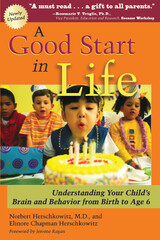
This new paperback edition, updated with the latest information and new material, offers parents and educators a rich and invaluable resource on how children learn to live in family and society from birth to age six. Norbert Herschkowitz, MD, and his wife Elinore Chapman Herschkowitz draw on their lifetime of experience in studying infants and children to explain how brain development shapes a child’s personality and behavior. Organizing their narrative by age, the authors examine a wide range of social development issues, from appropriate rule-setting to the development of key character elements in a child such as moral sensibility, temperament, language development, playing, aggression, impulse control, and empathy.
Some of the most popular features of the hardcover edition are retained here, including the question-and-answer section that concludes each chapter with real questions posed by parents to Dr. Herschkowitz, as well as brain maps and charts that display milestones in the development of various skills. Additional new material addresses concerns about prematurely born babies and the issue of resilience in children.
In today’s world, children grow up in an incredibly complex and highly sensory environment. A Good Start in Life offers a clear, concise, and richly detailed guide infused with warmth and encouragement that enables parents and educators to constructively stimulate and shape their children’s cognitive and social development.
“A must read . . . a gift to all parents.”—Rosemarie T. Truglio, vice-president, Education and Research, Sesame Workshop
“Do the first three years of life represent a critical period for all aspects of development? Are we the product of our genes or of our environment? Does early exposure to Mozart make for smarter babies? The answers to these and other pressing questions are skillfully and elegantly answered in this wonderful book, which I enthusiastically recommend.”
—Charles A. Nelson, Distinguished McKnight University Professor of Child Psychology, Neuroscience, and Pediatrics, University of Minnesota
“This delightfully written book . . . is not merely a how-to book, but a book about understanding how a child truly grows.”
—Guy McKhann, MD, The Johns Hopkins School of Medicine
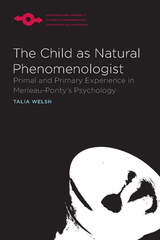
Welsh demonstrates Merleau-Ponty’s unique conception of the child’s development as inherently organized, meaningful, and engaged with the world, contrary to views that see the child as largely internally preoccupied and driven by instinctual demands. Welsh finds that Merleau-Ponty’s ideas about human psychology remain relevant in today’s growing field of child studies and that they provide important insights for philosophers, sociologists, and psychologists to better understand the human condition.
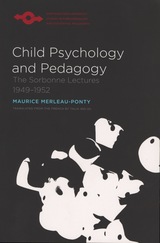
Merleau-Ponty’s Sorbonne lectures of 1949 to 1952 are a broad investigation into child psychology, psychoanalysis, pedagogy, phenomenology, sociology, and anthropology. They argue that the subject of child psychology is critical for any philosophical attempt to understand individual and intersubjective existence. Talia Welsh’s new translation provides Merleau-Ponty’s complete lectures on the seminal engagement of phenomenology and psychology.
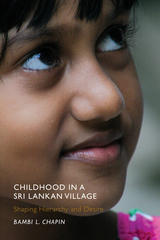
Over ten years ago, anthropologist Bambi Chapin traveled to a rural Sri Lankan village to begin answering this question, getting to know the toddlers in the village, then returning to track their development over the course of the following decade. Childhood in a Sri Lankan Village offers an intimate look at how these children, raised on the tenets of Buddhism, are trained to set aside selfish desires for the good of their families and the community. Chapin reveals how this cultural conditioning is carried out through small everyday practices, including eating and sleeping arrangements, yet she also explores how the village’s attitudes and customs continue to evolve with each new generation.
Combining penetrating psychological insights with a rigorous observation of larger social structures, Chapin enables us to see the world through the eyes of Sri Lankan children searching for a place within their families and communities. Childhood in a Sri Lankan Village offers a fresh, global perspective on child development and the transmission of culture.
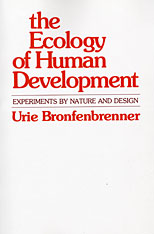
Here is a book that challenges the very basis of the way psychologists have studied child development. According to Urie Bronfenbrenner, one of the world’s foremost developmental psychologists, laboratory studies of the child’s behavior sacrifice too much in order to gain experimental control and analytic rigor. Laboratory observations, he argues, too often lead to “the science of the strange behavior of children in strange situations with strange adults for the briefest possible periods of time.” To understand the way children actually develop, Bronfenbrenner believes that it will be necessary to observe their behavior in natural settings, while they are interacting with familiar adults over prolonged periods of time.
This book offers an important blueprint for constructing such a new and ecologically valid psychology of development. The blueprint includes a complete conceptual framework for analysing the layers of the environment that have a formative influence on the child. This framework is applied to a variety of settings in which children commonly develop, ranging from the pediatric ward to daycare, school, and various family configurations. The result is a rich set of hypotheses about the developmental consequences of various types of environments. Where current research bears on these hypotheses, Bronfenbrenner marshals the data to show how an ecological theory can be tested. Where no relevant data exist, he suggests new and interesting ecological experiments that might be undertaken to resolve current unknowns.
Bronfenbrenner’s groundbreaking program for reform in developmental psychology is certain to be controversial. His argument flies in the face of standard psychological procedures and challenges psychology to become more relevant to the ways in which children actually develop. It is a challenge psychology can ill-afford to ignore.
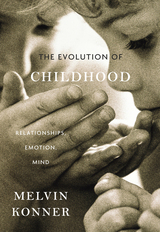
This book is an intellectual tour de force: a comprehensive Darwinian interpretation of human development. Looking at the entire range of human evolutionary history, Melvin Konner tells the compelling and complex story of how cross-cultural and universal characteristics of our growth from infancy to adolescence became rooted in genetically inherited characteristics of the human brain.
All study of our evolution starts with one simple truth: human beings take an extraordinarily long time to grow up. What does this extended period of dependency have to do with human brain growth and social interactions? And why is play a sign of cognitive complexity, and a spur for cultural evolution? As Konner explores these questions, and topics ranging from bipedal walking to incest taboos, he firmly lays the foundations of psychology in biology.
As his book eloquently explains, human learning and the greatest human intellectual accomplishments are rooted in our inherited capacity for attachments to each other. In our love of those we learn from, we find our way as individuals and as a species. Never before has this intersection of the biology and psychology of childhood been so brilliantly described.
"Nothing in biology makes sense except in the light of evolution," wrote Dobzhansky. In this remarkable book, Melvin Konner shows that nothing in childhood makes sense except in the light of evolution.


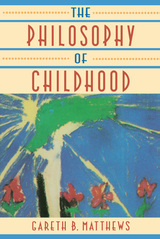
So many questions, such an imagination, endless speculation: the child seems to be a natural philosopher--until the ripe old age of eight or nine, when the spirit of inquiry mysteriously fades. What happened? Was it something we did--or didn't do? Was the child truly the philosophical being he once seemed? Gareth Matthews takes up these concerns in The Philosophy of Childhood, a searching account of children's philosophical potential and of childhood as an area of philosophical inquiry. Seeking a philosophy that represents the range and depth of children's inquisitive minds, Matthews explores both how children think and how we, as adults, think about them.
Adult preconceptions about the mental life of children tend to discourage a child's philosophical bent, Matthews suggests, and he probes the sources of these limiting assumptions: restrictive notions of maturation and conceptual development; possible lapses in episodic memory; the experience of identity and growth as "successive selves," which separate us from our own childhoods. By exposing the underpinnings of our adult views of childhood, Matthews, a philosopher and longtime advocate of children's rights, clears the way for recognizing the philosophy of childhood as a legitimate field of inquiry. He then conducts us through various influential models for understanding what it is to be a child, from the theory that individual development recapitulates the development of the human species to accounts of moral and cognitive development, including Piaget's revolutionary model.
The metaphysics of playdough, the authenticity of children's art, the effects of divorce and intimations of mortality on a child--all have a place in Matthews's rich discussion of the philosophical nature of childhood. His book will prompt us to reconsider the distinctions we make about development and the competencies of mind, and what we lose by denying childhood its full philosophical breadth.
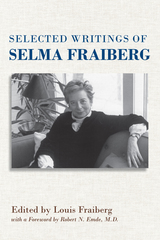
Like The Magic Years, these essays (including her hugely influential “Ghosts in the Nursery”) glean their insights from years of clinical study and contain Fraiberg’s synthesis of and groundbreaking contributions to attachment theory, child psychology, social work, and, through her work with blind children, the experience of disability in infancy and childhood. Clinical rigor paired with attunement to the emotional lives of her subjects was Fraiberg’s hallmark: as her husband Louis writes in his preface to this volume, “Once, when asked how she knew what babies were thinking, she replied, ‘They tell me.’” Lucid and elegantly written, her Selected Writings will remain a valuable resource for new generations of social workers, mental-health professionals, educators, and others who work with young children.
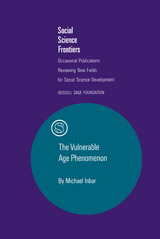
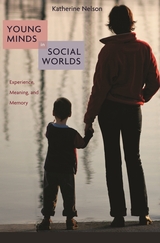
Katherine Nelson re-centers developmental psychology with a revived emphasis on development and change, rather than foundations and continuity. She argues that children be seen not as scientists but as members of a community of minds, striving not only to make sense, but also to share meanings with others.
A child is always part of a social world, yet the child's experience is private. So, Nelson argues, we must study children in the context of the relationships, interactive language, and culture of their everyday lives.
Nelson draws philosophically from pragmatism and phenomenology, and empirically from a range of developmental research. Skeptical of work that focuses on presumed innate abilities and the close fit of child and adult forms of cognition, her dynamic framework takes into account whole systems developing over time, presenting a coherent account of social, cognitive, and linguistic development in the first five years of life.
Nelson argues that a child's entrance into the community of minds is a slow, gradual process with enormous consequences for child development, and the adults that they become. Original, deeply scholarly, and trenchant, Young Minds in Social Worlds will inspire a new generation of developmental psychologists.
READERS
Browse our collection.
PUBLISHERS
See BiblioVault's publisher services.
STUDENT SERVICES
Files for college accessibility offices.
UChicago Accessibility Resources
home | accessibility | search | about | contact us
BiblioVault ® 2001 - 2024
The University of Chicago Press









